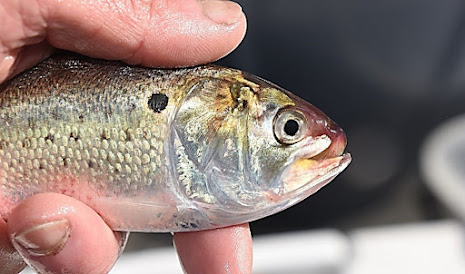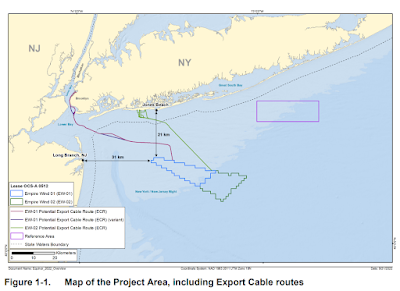Change in Striped bass regulations could allow Omega Protein to take more menhaden.Say NO WAY to an increased quota for the menhaden fishery TODAY!
For decades New Jersey anglers have fought to conserve the favorite food of striped bass: Atlantic menhaden (aka BUNKER). We banned reduction fishing here in NJ and so did every other state--except Virginia. Two years ago, when Omega’s reduction fleet couldn't find any fish in Virginia waters, the motherships motored all the way up to the NY/NJ bight where they caught millions of fish just outside of state lines, to the great frustration of local fishermen and whale watchers. Somehow, this one company continues to exploit hundreds of millions of forage fish every year, despite being universally hated by recreational fishermen and conservationists.
Is Omega Protein Inc. using Striped bass regs to take more Bunker??
Omega Protein could be allowed to catch even more fish if changes are made to the striped bass management plan. Because the ASMFC implemented a new ecological management system for menhaden last year, the menhaden catch is now determined by the management of other species. The dietary needs of striped bass, weakfish, and bluefish are now considered when menhaden catch limits are established. Amendment 7 to the striped bass management plan is considering an option to lower the "biological reference points" for striped bass. If this happens, then Omega Protein may be able to increase harvest levels and catch more fish.
If the ASMFC changes the goalposts for striped bass management, it will be bad news for striped bass recovery, bad news for menhaden, and bad news for our coastal ecosystem and economy. We cannot let this happen.
Reduction fishing should come to an end, not increase its volume and intensity, particularly when striped bass are already overfished. We need to hold the line on striped bass management in part to hold the line on the reduction fishery. Let's not change the biological reference points. Let's make sure that the ASMFC does its job and rebuilds the striped bass population. Get involved today and refuse to let Omega Protein (or the commercial striped bass fishermen in Delaware) win on this one.
Say no to an increased quota for the menhaden fishery today.
You have a choice, send your own comments using the below suggestions or use our online petition, takes 2 seconds at this link:
MENHADEN PETITION (menhadendefenders.org)
or email own your comments@asmfc.org. The deadline is April 9th.
Suggestions for comments:
1) The ASMFC should postpone Amendment 7 to the Striped Bass Management Plan until a benchmark stock assessment is complete. There is no scientific justification for any of the changes being proposed. While the current management plan is not perfect, the bigger issue is that it has not been implemented effectively. The ASMFC needs to do a better job reducing fishing mortality--not change the goalposts in the middle of the game to account for management failures. This whole amendment should be put on ice until new science is available for management use.
2) The current biological
reference points are adequate for the management of the striped bass fishery. The
problem is that fishing mortality has never been at the right level to achieve
the biomass target--not that the biomass target is wrong. Fishing mortality
simply must be reduced.
3) This issue is important not
only for striped bass but for menhaden too. If the striped bass reference
points are lowered, then the new ecological management system for menhaden will
allow a larger quota for the menhaden fishery, 75% of which goes to the foreign-owned reduction fishing fleet in Virginia.
The menhaden ecological
reference points are defined in the following way:
ERP target: the maximum fishing
mortality rate (F) on Atlantic menhaden that sustains Atlantic striped bass at
their biomass target when striped bass are fished at their F target ERP
threshold: the maximum F on Atlantic menhaden that keeps Atlantic striped bass
at their biomass threshold when striped bass are fished at their F target.
Because these menhaden
reference points are keyed to the striped bass reference points, if the striped
bass reference points are lowered, then a potential cascading effect could
occur with fewer menhaden available to feed fewer striped bass.
4) If the ASMFC wants to do more to protect striped bass, without curtailing striped bass fishing mortality, then it should further cut the catch of the menhaden reduction fishing industry. According to the best available science: current menhaden reduction fishing undermines the striped bass population by as much as 28%.
-Atlantic herring are
overfished. The Ecological Reference Points Working Group and the Menhaden
Management Board at the ASMFC failed to take into account the Atlantic herring
stock status when setting the menhaden quota last year. If they had, then the
menhaden catch would have been substantially lower. That's because Atlantic
herring serves as an alternative prey to menhaden for striped bass. The ASMFC
must incorporate this stock status information next year during the update
assessment process.
5) Unless the ASMFC is prepared
to substantially reduce the fishing pressure on important forage species like
menhaden, then the ASMFC should postpone this amendment until the Benchmark
Stock Assessment is ready for management use in 2025 or later.
6) Thank you for your
consideration of these critical ecosystem concerns.








Comments
Post a Comment